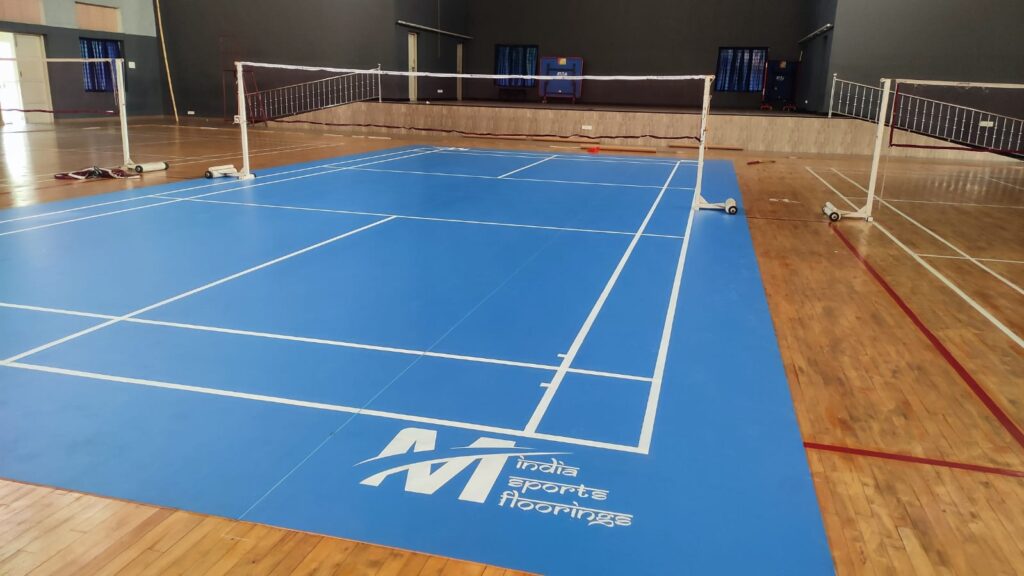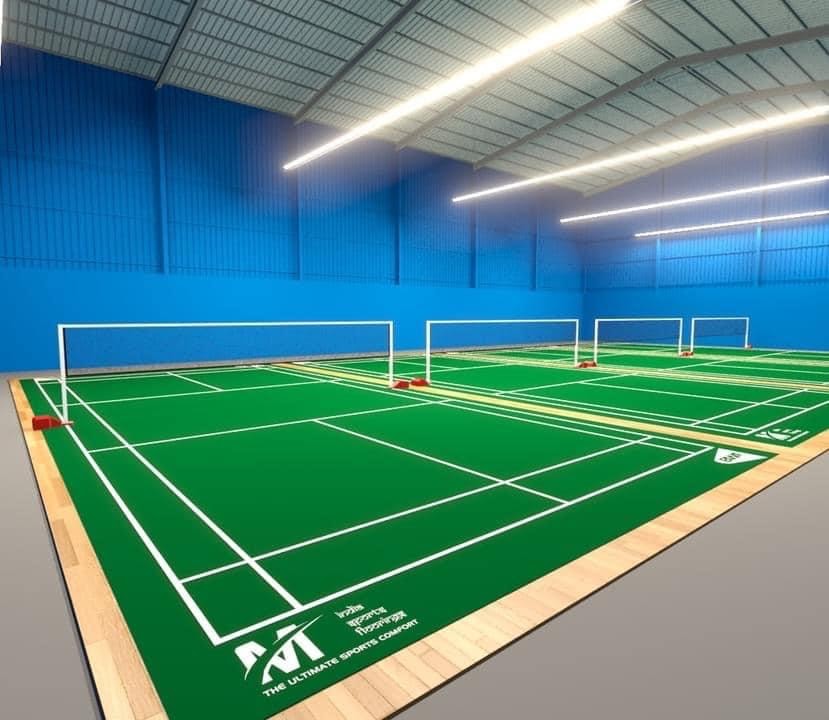
Top Reasons Why Synthetic Mats Are Perfect for Badminton Courts in 2024
Outline
-
Introduction
- Overview of badminton’s popularity
- Importance of quality courts
-
History of Badminton Court Surfaces
- Traditional court materials
- Evolution of synthetic mats
-
Advantages of Synthetic Mats
- Durability
- Cost-effectiveness
-
Enhanced Performance
- Improved grip and traction
- Consistent playing surface
-
Safety Considerations
- Reduced risk of injuries
- Shock absorption properties
-
Maintenance and Longevity
- Easy to clean
- Long-lasting with minimal upkeep
-
Environmental Impact
- Eco-friendly materials
- Sustainability in production
-
Weather Resistance
- Suitable for indoor and outdoor use
- Performance under different weather conditions
-
Customization Options
- Available in various colors and designs
- Branding opportunities
-
Installation Process
- Ease of installation
- Time and cost involved
-
Case Studies and Examples
- Successful implementations in major tournaments
- Testimonials from players and coaches
-
Comparative Analysis
- Synthetic mats vs. traditional wooden floors
- User preferences
-
Technological Advancements
- Innovations in synthetic materials
- Future trends
-
Market Trends in 2024
- Growing demand for synthetic courts
- Impact on the sports industry
-
Conclusion
- Summary of key points
- Final thoughts on synthetic mats
-
FAQs
- What are synthetic mats made of?
- How do synthetic mats compare in cost to traditional courts?
- Are synthetic mats suitable for all skill levels?
- How long does a synthetic mat last?
- Can synthetic mats be used in professional tournaments?
Top Reasons Why Synthetic Mats Are Perfect for Badminton Courts in 2024
Introduction
Badminton, a sport loved by millions worldwide, requires not only skill and agility but also a top-notch playing surface. The quality of the court can significantly impact the game, from player performance to safety. In recent years, synthetic mats have become the preferred choice for badminton courts, offering numerous benefits over traditional materials. But what makes them so special in 2024? Let’s dive into the top reasons why synthetic mats are perfect for badminton courts this year.
History of Badminton Court Surfaces
Traditional Court Materials
Historically, badminton courts were made of hardwood, typically maple or oak, known for their robustness and good playing characteristics. While these surfaces offered a natural feel and aesthetic appeal, they came with several drawbacks, including high maintenance costs and susceptibility to damage.
Evolution of Synthetic Mats
The shift towards synthetic mats began in the late 20th century, driven by the need for more durable, cost-effective, and low-maintenance solutions. Today, synthetic mats have evolved with advanced technology, providing superior performance characteristics tailored for badminton.
Advantages of Synthetic Mats
Durability
One of the most significant advantages of synthetic mats is their exceptional durability. Unlike wooden courts that can warp or crack over time, synthetic mats are resistant to wear and tear, even with intensive use.
Cost-effectiveness
Synthetic mats are more economical in the long run. They require less frequent replacement and lower maintenance costs, making them a financially sound investment for sports facilities.
Enhanced Performance
Improved Grip and Traction
A key factor in badminton is the player’s ability to move quickly and change direction efficiently. Synthetic mats offer superior grip and traction, reducing the likelihood of slips and enhancing overall performance.
Consistent Playing Surface
Synthetic mats provide a uniform playing surface, eliminating the inconsistencies found in wooden floors. This consistency ensures that players can rely on predictable bounce and movement, crucial for competitive play.
Safety Considerations
Reduced Risk of Injuries
Safety is paramount in any sport. Synthetic mats are designed to reduce the risk of injuries by providing better shock absorption. This feature minimizes the impact on players’ joints and muscles, decreasing the likelihood of strains and sprains.
Shock Absorption Properties
The shock-absorbing nature of synthetic mats protects players from the harsh impacts associated with jumping and rapid movements, contributing to longer, injury-free careers.
Maintenance and Longevity
Easy to Clean
Synthetic mats are straightforward to clean and maintain. Regular sweeping and occasional mopping keep the surface in pristine condition, saving time and effort.
Long-lasting with Minimal Upkeep
With proper care, synthetic mats can last for many years. Their resistance to staining and damage means they retain their quality and appearance with minimal upkeep.
Environmental Impact
Eco-friendly Materials
Many synthetic mats are now made from eco-friendly materials, reflecting a growing trend towards sustainability in sports infrastructure. These materials are often recyclable, reducing environmental impact.
Sustainability in Production
The production processes for synthetic mats have also become more sustainable, with manufacturers adopting greener practices to minimize their carbon footprint.
Weather Resistance
Suitable for Indoor and Outdoor Use
Synthetic mats are versatile, performing well in both indoor and outdoor settings. Their weather-resistant properties make them ideal for a variety of environments, from gymnasiums to outdoor courts.
Performance Under Different Weather Conditions
These mats maintain their quality and functionality regardless of weather conditions. Whether it’s humid, rainy, or dry, synthetic mats provide a reliable playing surface.
Customization Options
Available in Various Colors and Designs
Synthetic mats offer a wide range of customization options. They can be produced in different colors and designs, allowing for personalized aesthetics that match team colors or branding requirements.
Branding Opportunities
For sports facilities and sponsors, synthetic mats present excellent branding opportunities. Logos and slogans can be incorporated into the mat design, enhancing visibility and brand recognition.
Installation Process
Ease of Installation
Installing synthetic mats is relatively straightforward compared to traditional wooden floors. The process is quicker and involves less disruption, making it ideal for facilities needing a fast turnaround.
Time and Cost Involved
The installation of synthetic mats is cost-effective, both in terms of time and money. The reduced labor and quicker installation time translate to significant savings.
Case Studies and Examples
Successful Implementations in Major Tournaments
Many major badminton tournaments have successfully implemented synthetic mats, including the All England Open and the BWF World Championships. These events showcase the mats’ superior performance and reliability.
Testimonials from Players and Coaches
Players and coaches frequently praise synthetic mats for their consistency and comfort. Testimonials highlight how these surfaces enhance training and competitive play.
Comparative Analysis
Synthetic Mats vs. Traditional Wooden Floors
When comparing synthetic mats to traditional wooden floors, the benefits of synthetic options are clear. They offer better durability, lower maintenance costs, and enhanced performance, making them the preferred choice for modern badminton courts.
User Preferences
Surveys and feedback from users indicate a strong preference for synthetic mats. Players appreciate the improved safety and performance characteristics, while facility managers value the cost savings and ease of maintenance.
Technological Advancements
Innovations in Synthetic Materials
The synthetic mats of today are the result of continuous innovation. Advances in materials science have led to the development of mats that are more durable, eco-friendly, and tailored for specific sports like badminton.
Future Trends
Looking ahead, we can expect further improvements in synthetic mats, including enhanced sustainability, better performance characteristics, and increased customization options.
Market Trends in 2024
Growing Demand for Synthetic Courts
The demand for synthetic badminton courts is on the rise, driven by their numerous benefits and the increasing popularity of the sport. This trend is expected to continue throughout 2024 and beyond.
Impact on the Sports Industry
The shift towards synthetic mats is having a significant impact on the sports industry, setting new standards for court quality and player safety. This change is encouraging more facilities to upgrade their surfaces, fostering better playing conditions for athletes.
Conclusion
In conclusion, synthetic mats offer a host of benefits that make them the ideal choice for badminton courts in 2024. From their durability and cost-effectiveness to the enhanced performance and safety they provide, synthetic mats represent the future of badminton surfaces. As technology continues to advance, these mats will only become better, further solidifying their place in the world of sports.
FAQs
What are synthetic mats made of?
Synthetic mats are typically made from materials like PVC, rubber, and polyurethane, which provide durability and excellent playing characteristics.
How do synthetic mats compare in cost to traditional courts?
While the initial cost of synthetic mats can be comparable to traditional courts, their lower maintenance and longer lifespan make them more cost-effective over time.
Are synthetic mats suitable for all skill levels?
Yes, synthetic mats are suitable for players of all skill levels, from beginners to professionals, offering consistent performance and safety.
How long does a synthetic mat last?
With proper maintenance, a high-quality synthetic mat can last over 10 years, depending on usage and care.
Can synthetic mats be used in professional tournaments?
Absolutely, many professional tournaments now use synthetic mats due to their superior performance, safety features, and consistency.
Ph no : 18004190106

